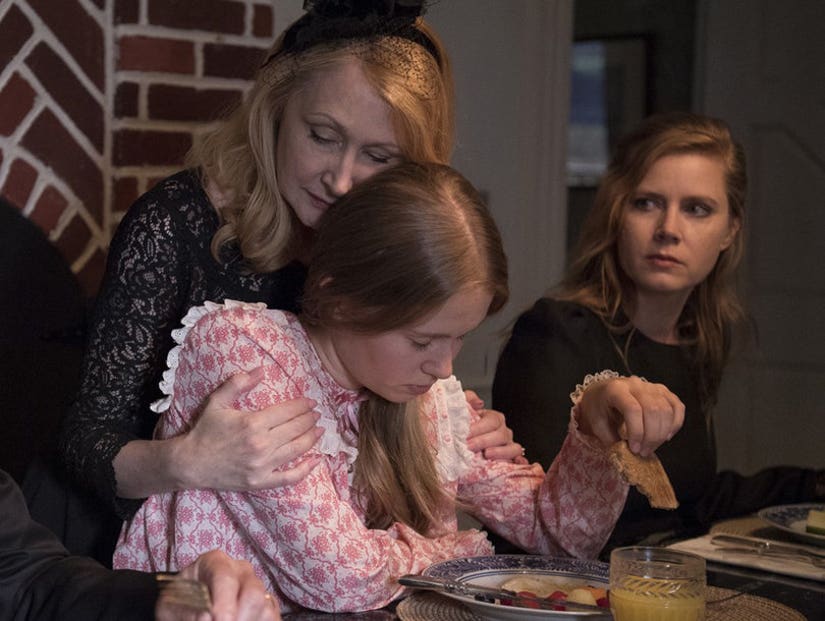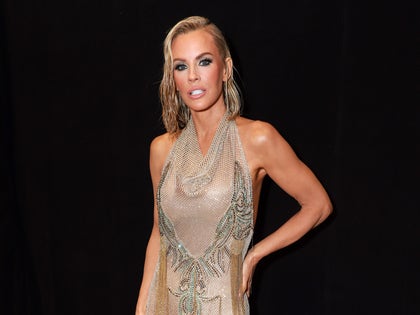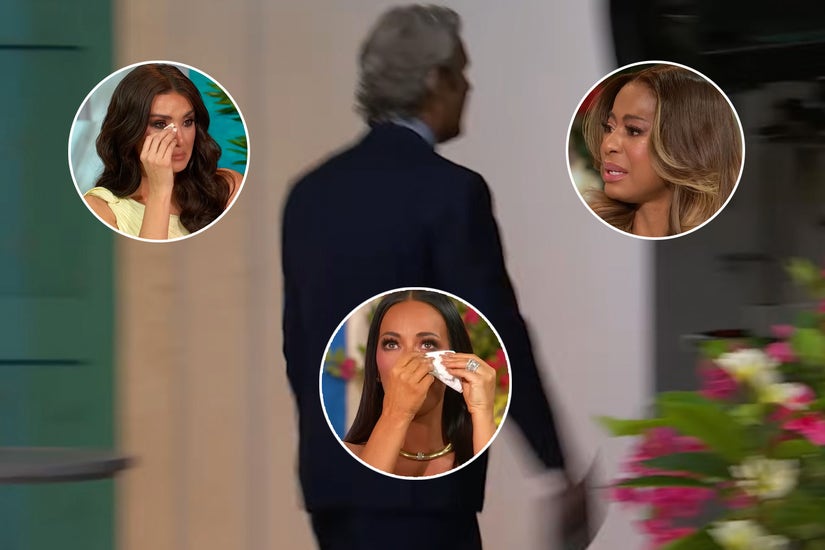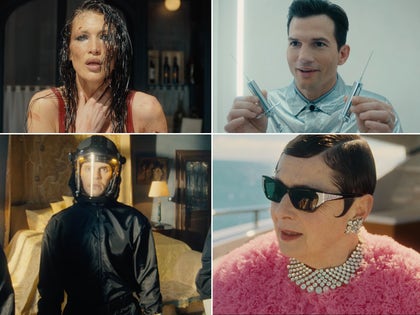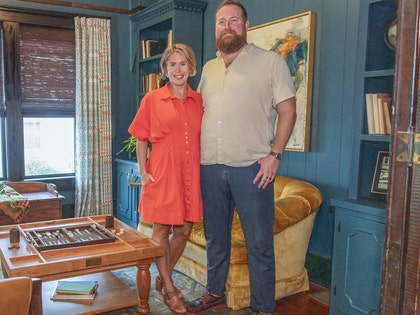"Sharp Objects" is turning into a series every bit as painful and uncomfortable to watch as "The Handmaid's Tale," only in ways that sometimes feel even more visceral and raw. This week, we saw just how close the women of the Preaker-Crellin family are to falling apart altogether.
This week, the connection between the two shows sharpened considerably with the inclusion of Sydney Sweeney to the cast as Alice, last seen as Nick's eager child bride on "Handmaid's Tale." Fans of that show know the tragic arc her story took in that series' second season, and more heartache was ahead for her as she shifted to another exploration of women's role in this world.
 HBO
HBO
'Sharp Objects': One 'Woman in White,' Two Dead Girls and 10 Murder Suspects
View StoryBarely hanging on seems to be the modus operandi for the women of "Sharp Objects," and at least for Camille (Amy Adams) and her sister, it all stems from Adora (Patricia Clarkson). The family matriarch isn't the star of the series, so viewers don't spend as much time inside her head, or exploring her day to day moments, but a picture is starting to emerge that she's just as fractured and fragile as her daughter, the big city reporter.
Checking Out
There wasn't much progress made on the suspect front in this third episode of the provocative murder mystery series, but we got one of our most sustained flashback sequences yet in a sequence that saw an adult Camille checking herself into a treatment center for her problem with self-harm. Unfortunately, the experience may have worsened her overall mental health.
At this point, Camille's body is a road map of pain, covered not only in scars from years of cutting, but also messages of frustration and rage carved into her body because she was not allowed to express these feelings overtly. It wasn't "proper," and if there is one thing that Adora values more than anything else, it's propriety.
This sequence may be the more recent stint in recovery that precipitated the assignment that sent her back to her home community, as Adams portrays herself and her new roommate, the aforementioned Alice, acknowledges their age difference. "I thought this was something you grow out of," she said sadly to Camille. Alas, our demons chase us so long as we allow them to do so.
Perhaps seeing a woman in her thirties still struggling with self-harm, still battling just to get through every day, proved too much for poor Alice. Her time with Camille was short, as she tragically took her own life by ingesting cleaner, and her loss was felt in a visceral way as Camille immediately started gouging chunks out of her own arm with a toilet bowl screw.
It was heartbreaking how savagely she was cutting, with so much rage and anguish, because she's been trained that "proper" girls behave and have decorum and do not rage and scream. Even without Adora's physical presence, her overpowering message dominates Camille's delicate psyche. It was actually refreshing to see her screaming in her car later in the episode after Adora threw her out of the victim' father's house during an interview, because at least that's a healthier way to process that emotion; though admittedly part of us was hoping she would let loose on her mother's cool restraint in that moment.
 Getty
Getty
Why 'Silicon Valley' Star Alice Wetterlund Says the Male Cast and Crew 'Can F--k Off Forever'
View Story"Let's Get Out of Here"
Perhaps the most powerful moment in the flashbacks with Alice was Alice's introduction of music to Camille. When Camille admitted she didn't really do music, we couldn't help but picture Adora's husband Alan (Henry Czerny) losing himself in his own music, via headphones. Something tells us "no music" is an edict of Adora, who would never approve of most popular music from any era.
Alice explained that music was an escape for her from the pain of everyday living, which is something that Camille has tried to adopt into her own life. Again, we consider Alan. We've seen several scenes of him retreating to his headphones, and often after some rejection of one kind or another by his wife. This time it was his idea that they could stay the night together after she injured her hand. "I'm sure that won't be necessary," she responded coldly.
And yet, as Alice's suicide proves, music can only take you so far away from your problems, and you always have to return to them. Alice never learned to battle her demons, and escaping from them didn't lead her to any long-lasting peace in her short life. Problems must be faced, battled and conquered. That goes for Alice as well as it does for Amma, Camille, Alan and even Adora.
Camille had her opportunity when Adora stormed into Bob Nash's home and forced her to abort her interview with him. Bob was fine talking to Camille, and she was actually sympathizing with her frustration, but none of that mattered. This is how Adora maintains control. Hers is a very outward expression of her insecurities, wheras her eldest daughter channels hers through internalized self-abuse.
There is a desperation in how Adora tries to run Wing Gap, and yet she does have incredible influence and power. It was the chief of police who called to tell her Camille was making a house call to the Nash home, proving who holds the real power in Wing Gap. Of course, that's like anywhere, money equals influence equals power. Power equals control, and if Adora can control the narrative, no one need see just how close to breaking she is.
 Getty
Getty
Maisie Williams' Cryptic 'Goodbye' to 'Game of Thrones' Sparks Bloody Fan Theories
View StoryReckless Abandonment
Camille internalized her rage at Adora's oppressive regime in the house through self-harm. Her sister, Amma (Eliza Scanlen), is externalizing it through reckless and wild behavior. At home, she portrays the dream daughter of Adora Crellin, respected member of Wing Gap society, while at night she roller skates around town with her cronies defying anyone to try and control her or tell her what to do. It's such a reckless existence, we found ourselves worrying for her safety by episode's end.
When Sheriff Vickery tells Adora that Amma was caught out after curfew, Adora immediately lashes out at her daughter. She attacks her for the way she's dressed, as well as her nighttime proclivities. It's telling that Amma can dress in her more provocative attire within the house and Adora usually doesn't even know. She checked out of her children's lives the moment Marian died.
And her grief is so controlling, all-consuming and complete that even Alan appears to have become an absentee father as he tries to appease his wife. This leaves Amma abandoned and alone in a home where she lives with both of her parents. And this week, the writers were certain to reiterate that Amma is the same age as the two girls who were mutilated and killed.
Camille self-harms to try and regain some control of her life and emotional state. Amma has reacted in much the opposite way, running away from Adora's oppression literally and emotionally by courting danger out after curfew, shirking the law and responsibilities. Adora tells her to cover up, and so she goes out in as little as possible. Hers is a twisted game, as she actually plays the role of Adora's perfect little angel at home, which Camille could never do.
One of the reasons those responses could be so different is the hinted-at sexual assault we suspect Camille suffered as a child. We've yet to go back to that shed the young Camille found after she was caught swimming by the boy who aimed a shotgun at her. It was all a little too ominous a setup, and we fear nothing good will come from the conclusion of that scene.
 AMC
AMC
'Walking Dead' at Comic-Con: Andrew Lincoln Confirms Departure After Insane Season 9 Trailer Wows Fans
View StoryThat Seems Suspect
There is still a murder mystery going on, even if the personal struggles of Camille and her family seem to overshadow that most weeks. With all the attention paid to Alice's influences on Camille, there was little time left to dig much deeper into the investigation. In fact, Det. Willis (Chris Messina) hardly featured in the episode at all, until his final shared scene with Camille interrupted by Amma's reckless and awful behavior. Who puts a sucker in their sister's hair? Honestly!
Amma - Speaking of Amma, she raised another red flag this week when she drunkenly told Camille, "They'd do anything for me," referring to her friends. She's being set up as more of a potential victim than perpetrator, though that could be a misdirect. Murdering her classmates as a way of acting out seems extreme, but Amma's behavior has been so mercurial at times, we wouldn't be surprised by anything anymore.
Bob - If Bob did kill the girls, it's possible he did so to cover up some perversion of his, and it's possible Adora helped him do it. Not only did she shut down his interview with Camille, she also insisted to Vickery that she didn't really think Bob should be a suspect. She even went so far as to flirt ... or at least we think that's what she was doing.
Adora - All of that, of course, makes Adora look more suspicious, as an accomplice or perpetrator herself.
Ashley - John's girlfriend was way too sweet, and yet tried in her own way to control his emotional responses to the death of his sister. Was wearing her cheerleader outfit even when school was out a way to do that? Had John said he liked the way she looked in it? It was certainly an odd choice that should have some meaning.
"Sharp Objects" airs Sundays at 9 p.m. ET on HBO.

